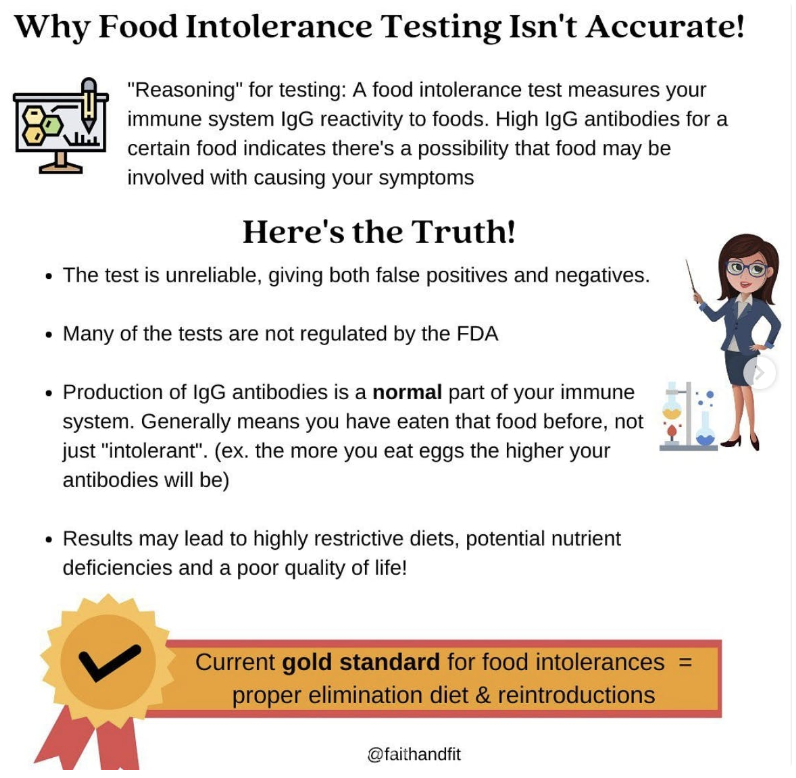Today, we’re focusing on food sensitivities. We’ve all heard of food sensitivity testing and likely seen an ad or two telling us how uncovering your food sensitivities will solve your gut/health issues.
The main problem with food sensitivity testing is that it looks at IgG antibodies that are a normal part of our immune system production. This leads to getting a large number of false positives and negatives on a food sensitivity test. My fellow RD, Lacey Dunn, has a great post breaking down why food sensitivity testing isn’t reliable and likely not the best investment in your health here.

Does this mean we ignore adverse food reactions?
No! Definitely not. I have seen many clients that have removed foods they have an apparent reaction to during the gut healing process, and then eventually add them back in.
If you think you don’t tolerate a specific food well, the answer isn’t just to eliminate it, but ask yourself why.
A reaction to a food isn’t normal. It’s a piece of feedback from your body that something is off. This helpful information is asking you to dig deeper. There are a number of different possible reasons for food sensitivities, let’s dig into the big 3 now!
Poor Digestion
When we don’t make enough stomach acid and digestive enzymes, we don’t break down our food properly. This leads to large food particles getting into the system and alerts our immune system. The important thing to distinguish here is that it isn’t just certain foods that can lead to food sensitivies. Any food can lead to a poor reaction in the gut if we aren’t breaking it down well. This is why you can do a food sensntivity test and see foods like beef, avocado, eggs, and coconut on there, especially if you eat them frequently and don’t break them down well.
What leads to poor digestion?
-Stress and being in the stressed state to often.
-Overgrowth of pathogens, parasites, yeast, dysbiotic bacteria.
-Slow metabolism/hypothyroidism/thyroid dysfunction.
-Gallbladder removal.
Just to name a few!
Slow Metabolism
When I say metabolism I’m not talking your weight. I’m talking about your body is functioning on a cellular level. Is it able to use the energy from the food you’re eating to generate heat or are you frequently cold? Is your digestion sluggish? Do you tend to have PMS and period problems? Do you struggle with acne (sign of poor detox capacity)? All of these are signs of a slow metabolism, which will absolutely impact how you breakdown your food, but also how quickly it moves through your digestive tract. When metabolism is slow, everything else slows down.
I use hair mineral testing in my practice to look at metabolic health, stress, nutrient deficiencies, and heavy metal detoxification, I also use body temperature and pulses.
I did an Instagram post on basal body temperature and what you can learn about thyroid and metabolic health as well that you can read here.
Overgrowth, Pathogens, & Parasites
Our digestive system should be able to kill the majority of parasites and pathogens that we come into contact with. The main way we do this is with stomach acid. Stomach acid is incredibly important for properly breaking down animal proteins and absorbing nutrients, but it’s also our first line of defense in the digestive system. We produce less stomach acid when we are stressed, eating a heavily grain/plant-based diet, nutrient deficiencies, alcohol consumption, some prescription medications, and have a sluggish metabolism.
When we have less stomach acid and poor digestion, we tend to allow parasites and pathogens to get through and inhabit our GI tract. This changes the gut’s environment and can lead to low beneficial bacteria since it’s harder for them to survive, an overgrowth of bad bacteria, and eventually yeast.
Side note: yeast is the last thing to grow. I often get clients that think candida or yeast overgrowth is their main problem, but there is always something deeper (like bacteria or parasite) that is why it grew in the first place.
If you have a history of gut issues and discomfort, I cannot recommend doing a GI map stool test enough. Regularly doing elimination diets and guessing when it comes to supplements is exhausting. Testing can tell you precisely what should and should not be there. Working with a practitioner can help you then apply the appropriate protocol. I currently offer GI map results reviews for my course members.
I’ve had many clients fully recover from food sensitivities after doing some gut healing. It doesn’t happen over night, but it’s so worth it in the long run both for your gut and hormone health.
Summary
In conclusion, food sensitivities are a symptom, a piece of communication from your body that something is off. If you suspect they are present, consider looking at digestive function, overall gut health (GI map stool testing is the most optimal), and assessing metabolic function.
I’m not saying to ignore foods you think you’re sensitive to, but I hope this sheds more light on the possible root cause of those sensitivities and where you can go from here. The goal is to enjoy as many foods as possible without feeling like you’re taking steps back with your health or having period problems.
I dig deeper into gut health in these two podcasts that I recommend you listen to if this post resonates with you, How Your Relationship With Food Impacts Your Gut & Stress with Dana Monsees and The Gut Skin Connection with Christa Biegler.
reminder: i’m currently taking on 1:1 clients. if you’d like to explore what it would be like to work together and if we are a good fit, fill out this form to get more details!
